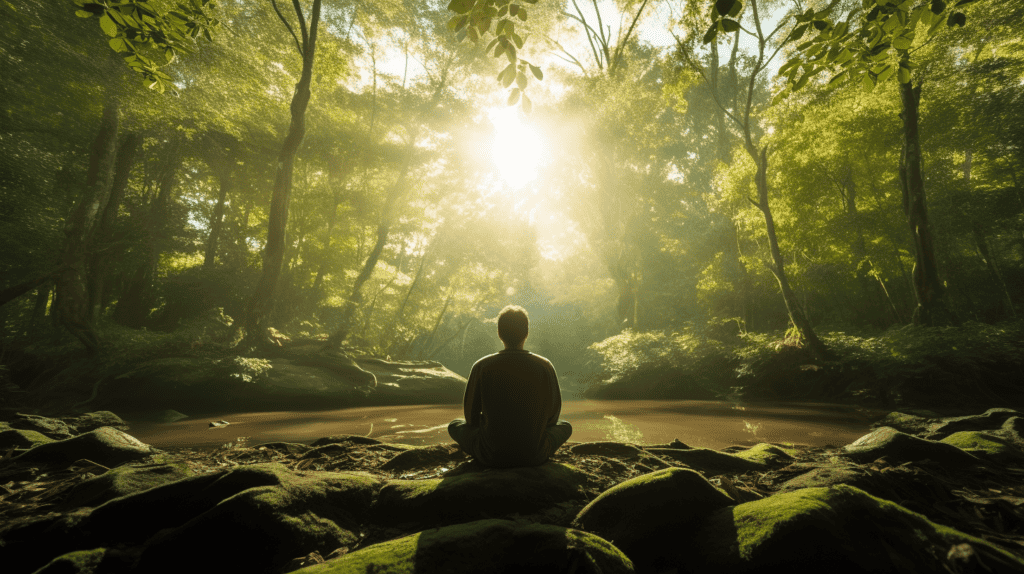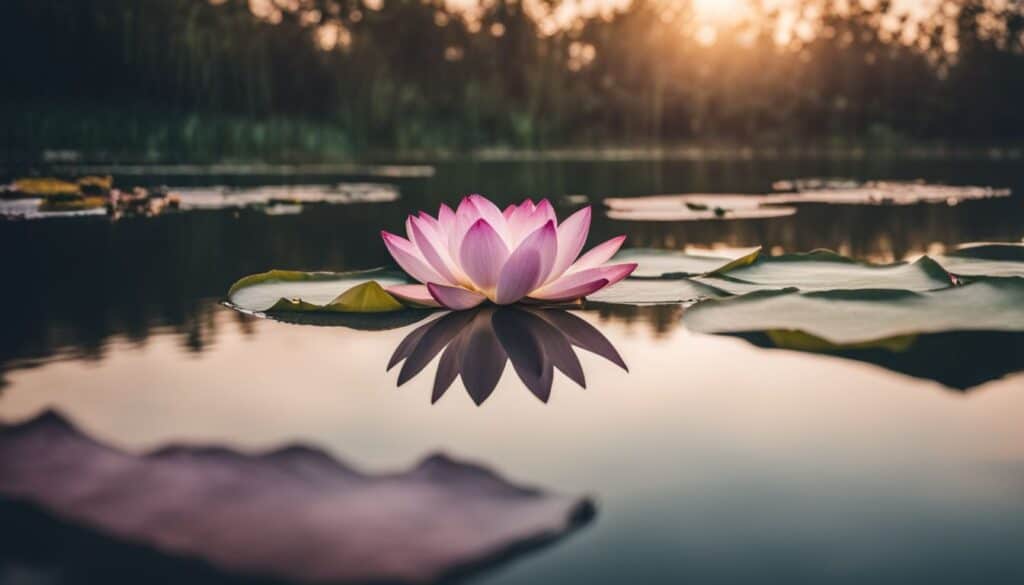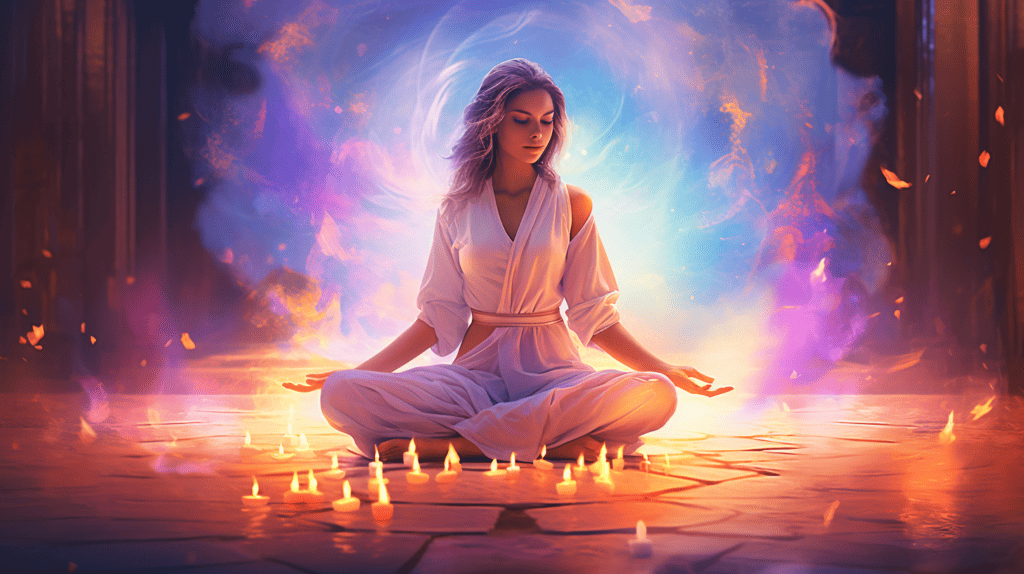As an experienced meditation teacher, I’ve seen firsthand the profound impact anxiety can have on the mind and body. This affliction can paralyze us, constricting our breath and causing our thoughts to race uncontrollably. Yet, there is a path toward serenity, a holistic approach practiced for millennia: meditation.
Now, let’s embark on this transformative journey and explore the power of spiritual meditation practices for anxiety to harmonize our hearts and minds amid life’s storms.
Key Takeaways
- Mindfulness meditation helps calm the mind by bringing awareness to the present moment.
- Breath-focused practices like deep breathing exercises lower stress hormones and physiological arousal.
- Progressive muscle relaxation releases tension and anxiety stored in the body.
- Guided imagery provides a mental escape to promote relaxation.
- Mantras and affirmations can reframe negative thought patterns.
- Yoga combines physical movement with meditation for holistic anxiety relief.
- Journaling allows the processing of emotions and anxious thoughts.
- Aromatherapy and soothing sounds enhance the relaxation response.
- Establishing a regular meditation practice builds resilience and equips individuals to handle anxiety long-term better.
Beginner Meditation Techniques for Anxiety Reduction
Meditation can be an incredibly effective way to manage anxiety. For beginners, techniques like mindfulness, deep breathing, and mantra meditation are easy to learn and can provide quick relief. Mindfulness meditation involves focusing your attention on the present moment nonjudgmental. I have included some outlines below to get you started.
“To begin to meditate is to look into our lives with interest and kindness and discover how to be wakeful and free.” – Jack Kornfield
Mindfulness Meditation
Mindfulness meditation is the art of being present. We allow anxious thoughts about the past or future to fade by directing our focus to the here and now. Begin with a practice as simple as observing the breath, acknowledging thoughts as they arise, and gently escorting your attention back to the breath without judgment.
Tip: I always recommend going easy on yourself. Thoughts will come and go. Try releasing your focus on them without judgment.
Progressive Muscle Relaxation
This technique is designed to reduce physical tension, often a symptom of anxiety. Starting at your toes and working your way up to the crown of your head, methodically tighten and then release each muscle group. Through this relaxation process, the body sends signals to the mind that it’s okay to unwind.
Simple Breath-Focused Meditation
The breath can be a powerful ally in the battle against anxiety. Breathing exercises for anxiety are straightforward: close your eyes, take deep, measured breaths, and focus on the rise and fall of your chest. This practice promotes stress reduction and can serve as an anchor during panic.
Tips for Getting Started
To practice meditation effectively, especially when you’re feeling anxious, consider these pointers:
- Find a quiet, comfortable space to sit or lie down undisturbed.
- Start with short sessions. Even a few minutes each day can make a difference.
- Be patient with yourself. Mind wandering is normal; the key is to return to the breath with kindness.
Breathwork and Mindfulness for Calming Mind and Body

Breathwork and mindfulness are powerful tools for calming the mind and body. By focusing on the breath, we can activate the body’s relaxation response, reduce feelings of stress and anxiety, and cultivate greater presence and self-awareness. Regular practice of breathing exercises and mindfulness meditation promotes mental clarity, emotional balance, and an overall sense of well-being.
“Unease, anxiety, tension, stress, worry — all forms of fear — are caused by too much future, and not enough presence.” – Eckhart Tolle
The Role of Breath in Regulating the Nervous System
Our breathing patterns directly influence the autonomic nervous system, which controls our stress response. Shallow, rapid breaths can trigger a fight-or-flight reaction, while deep, slow breaths can activate the body’s natural relaxation response.
Step-by-Step Guide to Mindful Breathing Exercises
Let’s dive into a breathing technique to reduce stress:
- Sit in a comfortable position, your back straight but not rigid.
- Close your eyes and take a long, slow inhale through your nose, counting to four.
- Hold your breath for a count of seven.
- Exhale completely through your mouth to a count of eight.
- Repeat for four cycles, gradually building up to eight cycles over time.
Integration of Mindfulness in Daily Activities
Incorporate mindfulness into daily routines such as eating, walking, or even during work breaks. Notice textures, flavors, sounds, and smells with acute attention. These moments of mindfulness can act as mini-meditations, bringing a sense of calm throughout the day.
Spiritual Encouragement Against Anxiety

In a world where the clamor of anxiety often drowns out inner peace, spiritual encouragement serves as a beacon of hope, guiding individuals through tumultuous seas. It offers a profound sense of solace, reminding us that we are not alone in our struggles as we draw strength from higher powers and deeper connections within ourselves. This form of support uplifts the spirit and empowers the mind.
Anxiety-Relieving Passages from Various Scriptures
Writings from spiritual traditions can provide solace and perspective. Verses such as “Be still and know that I am God” (Psalm 46:10) or “Let not your heart be troubled” (John 14:1) remind us to surrender our fears and rest in the assurance of a higher power.
Interpretation of Spiritual Writings for Modern-Day Anxiety
Interpreting these sacred texts, we understand the call to foster inner peace amidst external chaos. Through meditation, we learn to embody the wisdom of these teachings, applying them to our anxiety and allowing mindfulness to dissolve our worries.
How Spirituality Can Offer Perspective and Solace
Spirituality invites us to step back and view our lives from a wider vantage point. Anxiety often shrinks our world down to our fears, but spiritual practice expands our consciousness, reminding us of the vastness and beauty of existence—beyond our temporary anxieties.
Each of these practices paves the way toward mental tranquility and spiritual fulfillment. As we continue exploring further techniques in the following sections, remember that the meditation journey is as unique as you are. Experiment, explore, and most importantly, be gentle with yourself as you find the path that best suits your quest for peace.
The Healing Power of Visualization and Guided Imagery

The human mind possesses an extraordinary ability to affect the body; a phenomenon vividly demonstrated through the practice of visualization and guided imagery. By harnessing the power of envisioning positive outcomes and tranquil scenes, individuals can tap into a deep well of psychological and physiological benefits, potentially accelerating healing and promoting a sense of well-being.
This mind-body technique, rooted in ancient practices and now increasingly validated by modern science, offers a non-invasive and empowering tool to complement traditional medicine and improve overall health.
“The soul always knows what to do to heal itself. The challenge is to silence the mind.” – Caroline Myss
Techniques for Creating Calming Mental Images
Visualization is a potent form of meditation that involves creating peaceful scenes in the mind’s eye. It can transport you to serene landscapes, such as a gentle stream or a lush forest, providing a mental escape from anxiety. Here’s a way to begin:
- Sit or lie down in a comfortable position and close your eyes.
- Imagine a place where you feel safe and relaxed.
- Engage all of your senses to make the experience vivid: feel the sun’s warmth, hear the rustle of the leaves, smell the fresh earth after rain.
Resources for Guided Imagery Sessions
If you struggle to visualize on your own, consider guided imagery resources. Guided meditation audio tracks and apps can prompt you with narratives to help conjure up calming images. They can be beneficial for those new to the practice.
The Benefits of Regular Practice
Consistent use of visualization can significantly reduce stress levels, enhance mood, and lower anxiety symptoms. It provides a mental refuge and can also condition the mind to access a peaceful state more readily over time.
Mantras and Affirmations to Combat Anxious Thoughts

Mantras and affirmations are powerful tools in the quest for mental tranquility, offering a beacon of light amidst the tumultuous storms of anxious thoughts. By anchoring the mind with positive, self-assuring phrases, individuals can create a sanctuary of calm, disrupting the relentless waves of worry and stress.
This practice, rooted in ancient traditions yet embraced by modern psychology, provides a simple yet profound strategy to regain control over one’s internal dialogue, fostering a sense of peace and resilience in the face of life’s uncertainties.
Crafting Personal Affirmations for Anxiety Relief
Affirmations are positive, empowering statements that can help reframe negative thought patterns. Crafting personal affirmations begins with identifying your specific anxieties and creating counterstatements. For example:
- If you feel unworthy, affirm: “I am valued, and my contributions matter.”
- When you worry about the future, tell yourself: “I am capable of handling whatever comes my way.”
The Effectiveness of Mantras in Redirecting Thought Patterns
Mantras — sacred words or phrases repeated in meditation — can also anchor the wandering mind. Whether you choose traditional Sanskrit mantras like “Om” or personalized affirmations, the repetition can create a meditative rhythm that soothes the psyche.
Examples of Calming Affirmations and Mantras
Here are some mantras and affirmations to try:
- “Peace is within my reach.”
- “I am here, I am calm, I am present.”
- “Breathe in strength, breathe out tension.”
Meditation’s Impact on the Body’s Stress Response

Meditation, an ancient practice rooted in various cultural traditions, has emerged as a powerful tool for modulating the body’s response to stress. By engaging in regular meditation, individuals can activate their parasympathetic nervous system, the rest-and-digest counterbalance to the fight-or-flight response, leading to a reduction in stress hormones like cortisol.
This shift fosters a sense of calm and mental clarity and manifests in physiological benefits, such as lowered blood pressure and enhanced immune function, making meditation a pivotal practice for holistic well-being in our fast-paced modern world.
Understanding the Stress Response Mechanism
The body’s stress response, often known as the “fight-or-flight” mechanism, primes us for action. However, when this response is constantly triggered by chronic anxiety, it can take a toll on our physical health. Meditation helps by calming the sympathetic nervous system and encouraging the relaxation response.
Scientific Research on Meditation and Stress Hormones
Studies have shown that meditation can help reduce anxiety by decreasing the levels of cortisol, the stress hormone. Regular practitioners often report a more measured reaction to stressful situations, indicating a change in their physiological stress response.
Long-term Benefits of Meditation for Stress Management
Aside from acute anxiety relief, meditation promotes overall mental and physical health. Over time, the practice can lead to lower blood pressure, better sleep, and an improved immune system, making it a type of meditation that nurtures longevity and well-being.
Yoga Poses and Stretches for Anxiety Relief
Yoga’s Philosophy on Anxiety
Yoga teaches that anxiety is not just mental but also resides in the body. Physical postures, known as asanas, are designed to release this stored tension, contributing to a holistic approach to anxiety relief.
Specific Poses and Sequences that Help Reduce Anxiety
Specific asanas are particularly effective for calming the mind. These include:
- Child’s Pose (Balasana) — which helps to soothe the nervous system.
- Tree Pose (Vrksasana) — which promotes balance and focus.
- Corpse Pose (Savasana) — for complete relaxation and surrender.
Incorporating Yoga into a Regular Meditation Practice
Yoga and meditation complement each other beautifully. Begin or end a meditation session with a few gentle yoga stretches to prepare the body and mind. As you move and breathe, visualize tension washing away with each exhale, further enhancing the meditation for anxiety relief.
Journaling as a Tool for Managing Anxious Thoughts and Feelings
Journaling is a beacon of self-reflection in the tumultuous sea of anxious thoughts and feelings, offering a private canvas for the mind’s innermost narratives. By transforming abstract worries into concrete words, this simple yet profound practice empowers individuals to declutter their mental space and identify patterns in their anxiety.
It serves as a repository for immediate emotional release and a long-term companion for personal growth and emotional resilience.
The Therapeutic Effects of Writing
Journaling is a powerful adjunct to meditation practices. It acts as a release valve, allowing bottled-up emotions and thoughts to flow onto paper. This process can be incredibly therapeutic, providing clarity and a different perspective on anxious feelings.
Prompts to Guide Journaling for Anxiety
When journaling for anxiety, prompts can be instrumental in guiding your thoughts. Here are a few to explore:
- What are five things I am grateful for today?
- What worries are within my control, and what can I release?
- How did I overcome a difficult moment in the past?
Best Practices for Reflective Journaling
To maximize the benefits of journaling:
- Try to write daily, even if it’s just a few sentences.
- Be honest with your feelings; this is a judgment-free zone.
- Look for patterns in your writing that may reveal triggers for your anxiety.
Elements of Nature to Enhance Meditation
Embracing the elements of nature offers a profound way to deepen meditation practices. The gentle caress of a breeze, the rhythmic sound of flowing water, or the grounding embrace of the earth can harmonize the senses, guiding the mind to a state of serene attentiveness.
Integrating these natural elements can transform a routine meditation into an immersive experience, connecting the individual with the tranquil essence of the natural world.
Incorporating Natural Sounds into Meditation
The soothing sounds of nature, such as a babbling brook, rustling leaves, or gentle rainfall, can enhance the meditation experience. These sounds can help ground you in the present moment, often leading to deeper states of relaxation.
Using Aromatherapy to Deepen Relaxation
Aromatherapy brings another layer of calm to meditation. Scents like lavender, chamomile, and sandalwood can help reduce anxiety and stress, promoting deeper relaxation and focus during your practice.
Tips for Creating an Environment Conducive to Calm
Creating a serene space can significantly impact the quality of your meditation. Consider these tips:
- Keep the space clean and clutter-free.
- Include plants, soft lighting, or a dedicated altar to promote a peaceful atmosphere.
- Ensure your meditation spot is away from the hustle and bustle of household activity.
Building Long-Term Resilience Against Anxiety with Daily Meditation
Daily meditation emerges as a powerful tool in the quest for mental fortitude, offering a serene harbor in the tumultuous sea of modern life. By anchoring the mind in the present, this ancient practice strengthens our ability to weather the storms of anxiety with grace and steadiness. Embracing meditation as a daily ritual paves the way for long-term resilience, transforming our response to stress and fortifying our mental well-being.
Designing a Sustainable Daily Meditation Routine
Consistency is key to building resilience against anxiety. Establishing a daily meditation routine might seem daunting, but it can be as simple as dedicating five minutes each morning or evening to sitting in silence.
The Cumulative Effect of Regular Meditation on Anxiety
The more regularly you meditate, the stronger its effects will become. Over time, daily meditation can help rewire your brain to naturally respond more calmly to stressful situations, hence reducing anxiety in a lasting way.
Stories of Transformation Through Dedicated Practice
As your meditation guide, I’ve witnessed remarkable transformations in individuals dedicated to regular practice. Many have reported a profound sense of peace, improved coping skills, and even a decrease in the intensity and frequency of panic attacks.
Conclusion on Spiritual Meditation Practices for Anxiety
Recap of Key Points
In this guide, we’ve explored numerous spiritual meditation practices tailored to help ease anxiety. We’ve discovered many techniques to invoke calm and nurture tranquility through mindfulness, visualization, mantra repetition, yoga, and journaling.
Encouragement to Experiment with Various Techniques
I encourage you to experiment with the various methods detailed here. Each person’s journey with meditation is singular, and what resonates for one may differ for another. Be open to new approaches and listen to what your mind and body need.
Final Thoughts on the Journey to a Calmer Mind and Life Through Meditation
Remember, meditation is not a quick fix but rather a lifestyle—a serene path one chooses to walk upon every day. Whether you are battling an anxiety disorder or simply seeking stress management tools, meditation offers a refuge of peace and relaxation. Embrace the journey, and may your exploration of meditation lead to a more balanced, serene state of existence.
FAQ
Q: What is mindfulness meditation for anxiety relief?
A: Mindfulness meditation for anxiety relief is a specific meditation practice that aims to reduce stress and anxiety by focusing on the present moment and developing a greater awareness of thoughts and emotions.
Q: How does mindfulness meditation for anxiety work?
A: Mindfulness meditation works by encouraging individuals to observe their thoughts and emotions without judgment, helping them to gain a deeper understanding of their anxiety and stress triggers.
Q: What are some techniques involved in mindfulness meditation for anxiety relief?
A: Techniques involved in mindfulness meditation for anxiety relief may include body scan, deep breathing, mindful meditation, and mantra meditation. These practices can help individuals reduce feelings of anxiety and promote relaxation.
Q: Can mindfulness meditation help with anxiety and depression?
A: Yes, mindfulness meditation may help alleviate symptoms of anxiety and depression by promoting a sense of calm and aiding individuals in becoming aware of and managing their mental stress.
Q: How can I practice mindfulness meditation for anxiety relief?
A: You can practice mindfulness meditation for anxiety relief by finding a quiet, comfortable space, focusing on your breath, and using techniques that can help reduce anxiety, such as mindful breathing and body scan.
Q: What is the connection between mindfulness meditation and anxiety disorders?
A: Mindfulness meditation is often used as a complementary approach in treating anxiety disorders, as it can help individuals become more aware of their anxiety feels and develop healthier ways of coping with it.
Q: Can guided meditation be beneficial for anxiety and stress reduction?
A: Yes, guided meditation can be beneficial for anxiety and stress reduction as it provides individuals with support and direction in their meditation practice, helping them to stay focused and calm.
Q: How can mindfulness meditation for anxiety relief help in reducing panic attacks?
A: Mindfulness meditation for anxiety relief can help reduce panic attacks by teaching individuals to become more aware of their anxiety triggers and respond to them in a calm and controlled manner.
Q: When is the best time to practice mindfulness meditation for anxiety relief?
A: The best time to practice mindfulness meditation for anxiety relief is whenever you feel most comfortable and can set aside time to engage in the practice fully. Some people find it helpful to practice mindfulness meditation in the morning or before bed to reduce stress and anxiety.
Q: Are there specific meditation techniques that can help with anxiety and depression?
A: Yes, there are specific meditation techniques that can help with anxiety and depression, such as mindful breathing, body scan, and mantra meditation. These techniques can aid in reducing symptoms of anxiety and promoting emotional well-being.





Leave a Reply